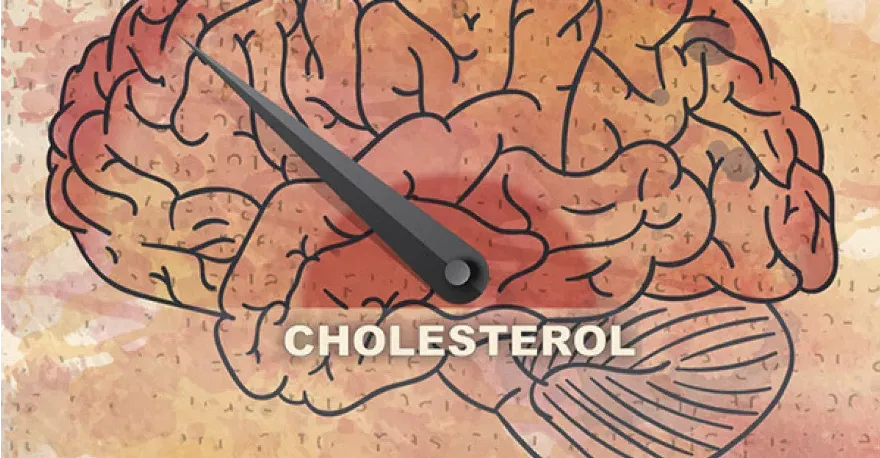Discover Why Oxidized Cholesterol May Be a Key Player in Alzheimer’s Disease Progression

Cholesterol is often vilified in discussions about heart health, but its role in brain health, particularly in the context of Alzheimer’s disease, is equally critical. Recent research has begun to spotlight oxidized cholesterol as a possible contributing factor to the development of this debilitating condition. Understanding this connection could open new avenues for both prevention and treatment strategies aimed at mitigating the impact of Alzheimer's.
Oxidized cholesterol, unlike its normal counterpart, has undergone a chemical change due to exposure to oxygen. This altered form of cholesterol is more reactive and has been linked to various pathological processes within the body, including those that occur in the brain which could lead to Alzheimer's disease. The potential for oxidized cholesterol to influence brain health is a significant concern that requires careful examination and understanding.
Understanding Cholesterol's Role in the Brain

Cholesterol in the brain plays several essential roles, from serving as a building block for cell membranes to acting as a precursor for the synthesis of important hormones and vitamin D. Despite its crucial functions, cholesterol in the brain needs to be tightly regulated. The brain maintains its cholesterol balance independently of the rest of the body, thanks to the blood-brain barrier—a protective shield that controls what enters and leaves the brain.
However, when there's an excess of cholesterol, the brain has mechanisms to deal with it, one of which involves the oxidation of cholesterol. This process is crucial because it transforms cholesterol into a form that can exit the brain, thus preventing its accumulation. Understanding these mechanisms is essential for grasping how cholesterol metabolism could be linked to neurodegenerative diseases like Alzheimer's.
The Blood-Brain Barrier and Cholesterol Transport
The blood-brain barrier is an effective gatekeeper that ensures the brain’s environment remains stable. Cholesterol, due to its size and structure, cannot directly cross this barrier under normal conditions. Instead, the brain synthesizes its own cholesterol and disposes of it independently. This autonomy in cholesterol management within the brain is critical but also complicates how substances like oxidized cholesterol might affect brain health.
The transport mechanisms involved in moving cholesterol into and out of the brain are complex and involve specific pathways and enzymes. One key player is the enzyme that oxidizes cholesterol, allowing it to be removed from the brain safely. This system's efficiency is vital for maintaining not only cholesterol balance but also overall brain health.
The Role of Oxidation in Cholesterol Management
In the brain, when cholesterol levels exceed what is needed, it can be oxidized by specific enzymes. This oxidation process is not merely a disposal mechanism; it’s a vital transformation that turns cholesterol into oxysterols, which can traverse the blood-brain barrier to be expelled. This system acts as a safety valve, preventing the buildup of excess cholesterol which could be detrimental to brain cells and overall brain function.
This enzymatic oxidation of cholesterol within the brain highlights the body's intricate systems for maintaining balance and preventing disease. However, when these systems falter or when external sources introduce oxidized cholesterol into the body, the delicate balance can be disrupted, leading to potential health issues, including neurodegenerative diseases.
The Double-Edged Sword of Oxidized Cholesterol

While the body's ability to oxidize cholesterol serves as a protective mechanism to prevent its accumulation in the brain, this process can also introduce risks. Oxidized cholesterol, or oxysterols, can be toxic if they accumulate, posing significant health risks not just to the cardiovascular system but also to the brain. Understanding this dual nature is crucial for grasping the broader implications of cholesterol oxidation.
Oxysterols are not benign byproducts; their buildup in the brain can lead to several pathological processes. These include the activation of inflammatory pathways and the potential disruption of normal cellular functions. Given their ability to easily cross the blood-brain barrier, the regulation and monitoring of these substances are critical for maintaining brain health and preventing diseases like Alzheimer's.
Entry of Oxysterols into the Brain
Oxysterols can cross into the brain from the bloodstream, a process that can have both beneficial and harmful effects. Under normal circumstances, this movement helps in maintaining cholesterol balance within the brain. However, when there's an excessive amount of oxidized cholesterol in the blood—often due to dietary choices or other health conditions—it can lead to an unhealthy accumulation in the brain.
This accumulation has been implicated in various brain-related health issues, including the potential development of Alzheimer’s disease. The ability of oxysterols to induce oxidative stress and inflammation within brain tissue highlights the need for strict regulatory mechanisms to control their levels both in the brain and systemically.
The Impacts of Oxysterols on Brain Health
The cytotoxic, mutagenic, and atherogenic properties of oxysterols make them particularly dangerous to brain health. Their ability to damage cellular DNA and contribute to the buildup of plaques within arteries, including those in the brain, is well-documented. The presence of higher levels of oxidized cholesterol in the brain, particularly in the context of Alzheimer’s disease, suggests a direct link between these substances and neurodegenerative processes.
The potential for oxysterols to contribute to the formation of amyloid plaques, a hallmark of Alzheimer's disease, further underscores the risks associated with these cholesterol oxidation products. The cytotoxic effects of oxysterols can lead to the death of neural cells and contribute to the overall degeneration of brain tissue, which is central to the progression of Alzheimer’s.
Clinical Evidence Linking Oxidized Cholesterol to Alzheimer's

Recent studies provide compelling evidence linking the levels of oxidized cholesterol with the risk and progression of Alzheimer’s disease. These findings are critical as they not only deepen our understanding of the disease’s etiology but also point towards potential markers for early diagnosis and targets for treatment.
Through detailed measurements and comparisons of oxidized cholesterol levels in the blood and brain, researchers have begun to piece together how these substances might contribute to Alzheimer’s pathology. The data from these studies are helping to shape a new perspective on how cholesterol management might influence brain health and disease.
Measuring Oxidized Cholesterol Levels
Advances in medical technology have allowed researchers to accurately measure oxidized cholesterol levels in the body. By analyzing blood samples, particularly those drawn from the jugular vein, which reflects the outgoing blood from the brain, scientists can estimate how much oxidized cholesterol is being transported in and out of the brain.
These measurements are pivotal in understanding the dynamic balance of cholesterol in the brain and the potential risks associated with its oxidation. By comparing the levels of incoming and outgoing oxidized cholesterol, researchers can infer the rate of oxidation occurring within the brain and its potential impact on neurological health. This type of research is fundamental in establishing a clear link between oxidized cholesterol and its effects on conditions like Alzheimer’s disease.
Comparing Brain Health and Cholesterol Oxidation
The relationship between brain health and cholesterol oxidation has been significantly illuminated by studies that compare the brains of Alzheimer’s patients with those of healthy individuals. Autopsies often show a stark difference in the accumulation of oxidized cholesterol products between these groups. In Alzheimer’s patients, these products are often present at much higher levels, suggesting a strong link between oxidized cholesterol and the disease’s pathological processes.
Such comparisons are crucial as they not only confirm the presence of higher levels of harmful cholesterol products in diseased brains but also help quantify the extent of oxidation. This information is key to understanding how cholesterol contributes to Alzheimer's and potentially offers a target for therapeutic intervention to slow or prevent disease progression.
Dietary Sources of Oxidized Cholesterol

One of the primary ways in which oxidized cholesterol enters our body is through our diet. Foods rich in cholesterol, particularly those that are processed or cooked at high temperatures, can contain significant levels of oxidized cholesterol. Being aware of these sources is crucial for managing intake and potentially reducing the risk of cholesterol-related health issues, including Alzheimer’s disease.
Animal products are major contributors to oxidized cholesterol in the diet. Foods like eggs, cheese, and certain meats undergo processes that can lead to cholesterol oxidation. Understanding which foods carry the highest risks and how they contribute to blood cholesterol levels can be essential for dietary planning, especially for those at increased risk of cholesterol-related diseases.
The Role of Animal Products in Cholesterol Oxidation
Animal products, particularly those that are processed or prepared at high temperatures, can be significant sources of oxidized cholesterol. For example, powdered eggs and fried meats undergo oxidation during processing and cooking, leading to higher levels of these harmful compounds. These food items are commonly consumed and can contribute substantially to the overall oxidized cholesterol burden in the body.
Awareness of the cholesterol content and the potential for oxidation in different animal products is crucial for dietary management. This knowledge can guide individuals in making healthier food choices, such as opting for less processed options and employing cooking methods that minimize cholesterol oxidation, like boiling or steaming instead of frying.
Oxidized Cholesterol in Processed Foods
Processed foods often contain oxidized cholesterol due to the industrial methods used in their production. For instance, the use of powdered eggs in various processed foods introduces oxidized cholesterol into a wide array of products commonly found on grocery shelves. Even seemingly innocuous items like canned tuna and certain dairy products can have elevated levels of oxidized cholesterol, making them less healthy than they might appear.
Understanding the prevalence of oxidized cholesterol in processed foods is vital for making informed dietary choices. By recognizing which products are likely to contain these harmful compounds, individuals can better manage their diet to reduce their intake of oxidized cholesterol, potentially lowering the risk of its negative health impacts, including those related to cognitive decline.
Strategies to Reduce Oxidized Cholesterol Intake

Reducing the intake of oxidized cholesterol involves a combination of smart dietary choices and cooking methods. By focusing on foods that are low in cholesterol and using cooking techniques that minimize oxidation, individuals can significantly reduce their exposure to these harmful compounds. This proactive approach can be an important part of a strategy to maintain brain health and reduce the risk of diseases like Alzheimer's.
Choosing foods that naturally contain less cholesterol and are less prone to oxidation is a practical step towards reducing oxidized cholesterol intake. Foods such as fruits, vegetables, and whole grains are not only free from cholesterol but also provide essential nutrients that can help maintain overall health.
Choosing Low-Oxysterol Foods
Selecting foods that are naturally low in cholesterol and less likely to contribute to its oxidation is a key dietary strategy. Plant-based foods, for instance, do not contain cholesterol and, thus, do not contribute to the levels of oxidized cholesterol in the body. Incorporating more fruits, vegetables, and whole grains into the diet can help reduce the intake of oxidized cholesterol and support overall health.
Moreover, choosing lean cuts of meat, opting for low-fat dairy products, and consuming more fish (with careful consideration of cooking methods to prevent oxidation) can also help manage cholesterol levels. These choices, combined with an overall balanced diet, can significantly influence the body's cholesterol balance and reduce the risk of its negative health effects.
Cooking Methods to Avoid Cholesterol Oxidation
The way food is cooked can significantly impact the levels of cholesterol oxidation that occur. Methods such as boiling, steaming, or baking are preferable as they are less likely to induce oxidation compared to frying or grilling. Adopting these cooking techniques can help reduce the intake of oxidized cholesterol.
Avoiding the use of high temperatures and long cooking times can also prevent the oxidation of cholesterol in foods. Using techniques like poaching or slow cooking can be effective in preserving the integrity of cholesterol, thereby reducing the risk of consuming oxidized cholesterol. Making these small adjustments in cooking methods can have a significant impact on health, particularly in reducing the risk of diseases influenced by diet, such as Alzheimer's.
The Future of Research on Cholesterol and Alzheimer's
The ongoing research into the link between cholesterol, particularly its oxidized forms, and Alzheimer's disease is crucial for developing effective prevention and treatment strategies. As our understanding of this relationship deepens, new avenues for intervention may emerge that could help mitigate the impact of this disease. Continued exploration of this field holds the promise of significant breakthroughs that could alter the landscape of Alzheimer's treatment and prevention.
Innovations in the methods used to test and measure oxidized cholesterol could lead to more precise diagnostics and better monitoring of disease progression. This could significantly enhance our ability to manage cholesterol-related risks associated with Alzheimer's.
Innovations in Testing and Measurement
Emerging technologies and methodologies in the field of medical research are enhancing our ability to accurately measure and understand the impact of oxidized cholesterol on health. These innovations promise to refine our diagnostic capabilities, potentially leading to earlier detection of Alzheimer’s disease and more targeted interventions.
As the precision of these tests improves, they may provide critical insights into how cholesterol oxidation can be controlled or mitigated. This could open up new preventive measures or treatments that specifically address the oxidative processes involved in cholesterol metabolism.
Potential Therapeutic Approaches
The research into cholesterol's role in Alzheimer’s disease is not just diagnostic but also therapeutic. Identifying how oxidized cholesterol contributes to the disease has spurred interest in developing treatments that target these pathways. Potential therapies could involve drugs designed to reduce cholesterol oxidation or to enhance the body’s natural defenses against oxidative stress.
Moreover, lifestyle interventions focusing on diet and exercise to manage cholesterol levels could also play a significant role in a comprehensive approach to Alzheimer’s prevention. Such strategies could help reduce the burden of disease and improve the quality of life for those at risk.
Conclusion: The Importance of Addressing Oxidized Cholesterol
Addressing the issue of oxidized cholesterol is crucial for maintaining brain health and reducing the risk of Alzheimer’s disease. By understanding the sources of oxidized cholesterol and adopting strategies to reduce its intake, individuals can take proactive steps toward preserving their cognitive function. As research continues to unfold, the link between cholesterol and brain health remains a pivotal area of study with the potential to significantly impact public health strategies and personal wellness practices.
In conclusion, the complex role of oxidized cholesterol in Alzheimer’s disease underscores the need for comprehensive approaches that encompass dietary management, lifestyle changes, and possibly medical interventions. By focusing on these areas, we can hope to reduce the impact of this and other cholesterol-related diseases, improving health outcomes for future generations.
